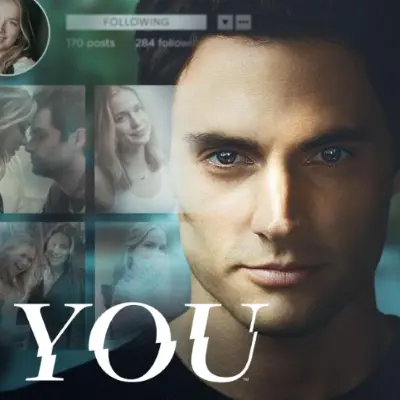In Season 3, You effectively transformed its murderous thriller format into a marital drama
-

"The biggest shifts this season are anything but cosmetic," says Alison Herman. "In its first two outings, You repeated the same basic pattern: Psychopath Joe Goldberg (Penn Badgley), a Patrick Bateman for the age of indie boys, becomes infatuated with a girl, and his crush quickly escalates to violent extremes. Besides the cross-country move, the biggest difference between Seasons 1 and 2 was their distribution. The show initially premiered on basic cable, which was an awkward match for its millennial demo. You was then acquired by Netflix and the first season exploded in popularity. The third season leads the service’s U.S. top 10 as of Wednesday, dethroning Squid Game. The show’s initial formula proved improbably effective. You tells an objectively disturbing tale: Joe is a serial stalker, manipulator, and killer. Yet its tone is viciously funny, starting with the perfect in-joke of its casting. Badgley rose to fame as Dan Humphrey, Gossip Girl’s 'Lonely Boy' who turned out to be its namesake. The invasive mean streak implied by that reveal was incidental, the unintended result of writers straining for surprise; on You, another show starring Badgley as a lovelorn voyeur, Joe’s dark side takes center stage. The show shares his contempt for literary pretension (New York) and showbiz aspiration (L.A.), but it also shows us what Joe can’t or won’t see: that the women he idealizes are actually kinda basic, and that Joe himself is a creep. Done poorly, the savage portrait of paramours like Guinevere Beck (Elizabeth Lail) would add insult to injury; not only does she end up dead, she’s also a terrible writer! But on You, it’s an indirect attack on the man who puts them on a pedestal. And Joe may think himself a romantic, but Badgley gives him the bug eyes and straining grin of a guy who can’t quite pull off his sensitive-bookworm disguise. You’s high-wire act may have been successful, but it wasn’t sustainable. At a certain point, the show risked becoming the story of a guy who literally, and repeatedly, gets away with murder—a shrewd exaggeration of sexism that still underscored a sexist status quo. (Enough fans weren’t getting the message that Badgley had to personally shoot down a few thirst tweets.) But in the final moments of Season 2, You made a pivot. All season, Joe pursued chef and faux-Erewhon heiress Love Quinn (Victoria Pedretti), convinced she was his soulmate. He was more right than he knew. Love, it turned out, was every bit the deceptive schemer Joe was, and just as capable of committing manslaughter on a whim. Plus she was pregnant, taking Joe’s preferred quick fix (the fatal kind) off the table. Off to Madre Linda they went! Even killers’ kids need good schools and a spacious backyard. In Season 3, You has room to unpack the full potential of that twist."
ALSO:
- You Season 3 got its ending all wrong: "Up until its conclusion, I thought this season of You may have been the best of the three," says Dustin Rowles. "There was some complexity to it. It wasn’t just about a guy who developed stalker-like obsessions with women. In season three, Joe had to balance his obsession with the struggles of suburban malaise, his marriage, and parenting a child." He adds: "The character of Joe has been exhausted, and I’m not sure how many cycles of obsession the series can sustain."
- You Season 3 makes a case against performative activism: In Season 3, Sherry is a realization of performative activism," says Meera Navlakha. "Performative activism has gained momentum in our collective consciousness particularly during the Black Lives Matter movement, throughout which social media users called out those who weren't displaying true allyship. Corporations and people alike were called out for these displays, with criticism directed at those seeking approval and praise for lacklustre gestures. For most viewers, I would assume Sherry's intentions are transparent. Her character speaks to a greater message: the rise of those congregating for a cause in order to benefit themselves, not the cause itself. In Sherry's case, her actions are purely a means to more power. By doing so, the grief and trauma of the Engler family are both minimised and sidelined."
- While auditioning, Tati Gabrielle wanted to know if You would honor her race in the depiction of Marienne: “I wanted to make sure that there wasn’t this sort of oblivious nature at all to Marienne that I didn’t feel comfortable in playing or just letting so many things go over Marienne’s head. When we speak to our family members or our friends, it’s like, ‘You know dang well, in that horror film, the Black person would have been so much more clued in than that,’” she said with a laugh.
- Shalita Grant is proud her You character is "the worst": "That is a dream come true!" she says. "I always play characters that people like, even when they’re not supposed to. I had so much fun being the worst!"
- Showrunner Sera Gamble on You's approach to Joe Goldberg in Season 3: "We were very interested in just who he is, as a husband, and who he is, as a father," she says. "He certainly has strong opinions about those roles, and he's also had such a strong desire to be that. And so, let's explore the reality for him."
- Gamble on why You fans are obsessed with obsession: "I don’t know if there’s one answer, but I think we all feel a little bit obsessive sometimes. Joe is just the very extreme version of impulses many of us have," she says. "There is something fun about watching someone actually do the things you would only ever think about; there’s something enjoyable about watching problematic people on TV do problematic things."
TOPICS: You (Netflix series), Netflix, Sera Gamble, Shalita Grant, Tati Gabrielle
